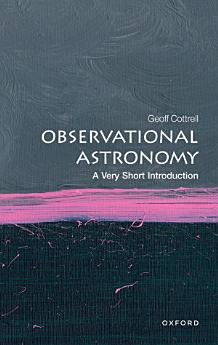Observational Astronomy: A Very Short Introduction, Edition 2
Apr 2023 · Oxford University Press
Ebook
160
Pages
family_home
Eligible
info
reportRatings and reviews aren’t verified Learn More
About this ebook
Very Short Introductions: Brilliant, Sharp, Inspiring Almost everything we know about the Universe has come from studying the messages carried by light from outer space. Until only a handful of decades ago, this meant observing optical photons in the narrow visible region of the electromagnetic spectrum. However, recent technological developments have now enabled us to extend this range and explore the Universe at radio, infrared, ultraviolet, X-ray, and gamma-ray wavelengths. The observations reveal a plethora of exotic phenomena such as young galaxies at the edge of the visible Universe, quasars, pulsars, colliding galaxies, and exploding stars, often at great distances. We have discovered that the Universe is expanding and that the expansion itself is accelerating. Closer to our home planet, we track killer asteroids and comets. Working closely together, observational astronomy and astrophysics have shown us how stars produce their energy, where the chemical elements come from, how black holes form, and how the giant supermassive black holes lurking in the hearts of galaxies spew immensely powerful jets of particles and energy thousands of light years out into space. And we now have new ways beyond light to probe the mysteries of the Universe. This Very Short Introduction describes how neutrinos and gravitational waves are revolutionizing our knowledge. How do we know all this? Advances in telescope technologies offer a partial explanation, but technology alone is not enough. Unlocking the secrets of the Universe also involves the critical application of the laws of physics to the observations. Cottrell describes how we are turning observations into knowledge and how theory, in turn, is inspiring new observations. ABOUT THE SERIES: The Very Short Introductions series from Oxford University Press contains hundreds of titles in almost every subject area. These pocket-sized books are the perfect way to get ahead in a new subject quickly. Our expert authors combine facts, analysis, perspective, new ideas, and enthusiasm to make interesting and challenging topics highly readable.
About the author
Geoff Cottrell obtained his PhD in Radio Astronomy at the Cavendish Laboratory, Cambridge University. After researching contact electrification of solidified rare gases near the absolute zero of temperature at UMIST in Manchester, he joined the UKAEA Culham Laboratory, working on the Joint European Torus (JET) experiment, where he became Session Leader. He observed a new form of super-thermal radio emission (Ion Cyclotron Emission) from energetic fusion alpha particles in the plasma. From 1999, he worked on a central issue for the development of fusion energy - fusion materials, in particular calculating the effect that energetic fusion neutrons would have on the wall of a power reactor. He was Director of the Culham International Summer School for Plasma Physics from 2006-2011. He is a fellow of the Royal Astronomical Society, and visiting scientist at the Oxford University Astrophysics Department and at the Rutherford Appleton Laboratory.
Rate this ebook
Tell us what you think.
Reading information
Smartphones and tablets
Install the Google Play Books app for Android and iPad/iPhone. It syncs automatically with your account and allows you to read online or offline wherever you are.
Laptops and computers
You can listen to audiobooks purchased on Google Play using your computer's web browser.
eReaders and other devices
To read on e-ink devices like Kobo eReaders, you'll need to download a file and transfer it to your device. Follow the detailed Help Center instructions to transfer the files to supported eReaders.






